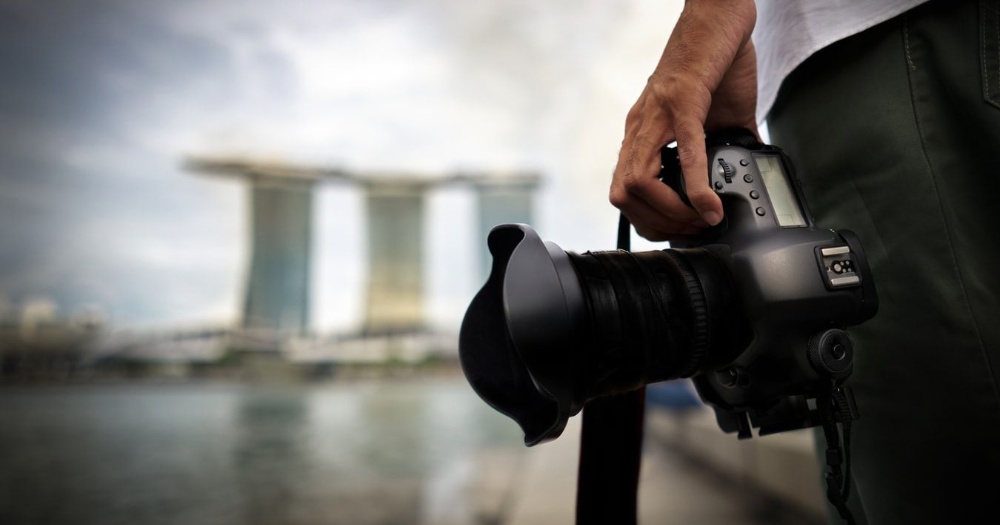Follow us on Telegram for the latest updates: https://t.me/mothershipsg
Photographers can now rejoice.
With new legislative changes, they will now own the rights to the photos they take by default, unless otherwise stated by a contract.
This means that a couple who engage a photographer to take photos on their wedding day will no longer own the rights to those photos by default, and will have to negotiate with the photographer for these rights to be transferred to them.
The change is expected to kick in around November, after amendments to the Copyright Act were passed in Parliament on Monday (Sep. 13).
Change is necessary due to technological advances
The Copyright Act was first introduced in Singapore in 1987.
According to Second Minister for Law Edwin Tong, changes to the law are currently necessary as technological advancements and technological changes have significantly affected how works and performances are created, distributed and consumed.
He brought up the ubiquity of smartphones and other technologies, and how these have impacted the Copyright Act.
"Now, anyone can be a photographer, or even produce a short video or film. New platforms enable new creators to reach their audiences directly. Faster internet speeds have shifted consumption from physical media and downloads to streaming. And the ubiquity of smartphones has led to consumption on the go," he said.
What will change?
There are several main changes.
The first category of changes will largely benefit creators and rights owners, and are meant to reward them for their creations and give them their due recognition for their effort.
Tong announced that once the changes kick in, when creative works are used in public, including distributing them online, the creator or performer of the content has to be identified and credited.
Exceptions will be made in some cases, like if the identity of the author or performer is not "reasonably ascertainable" by the user, or when the artistic work is situated in a public place.
Another major change is that creators of photographs, portraits, engravings, sound recordings and films will become the default first owners of the copyright, even if they were commissioned to make the work.
"For example, a photographer hired to take photos at an event would, by default, own the copyright to those photos he or she took," explained Tong.
Lastly, amendments will be made to the Copyright Act to penalise those who commercially profit off pirated works, such as those who sell set-up boxes that offer access to pirated online movies and shows.
Tong added that although these new provisions do not impose liability on consumers and users of these devices or software applications, they provide copyright holders with specific remedies to deal with such situations.
Important to educate the public on the changes
In response, several Members of Parliament (MPs) voiced their concerns with the amendments to the Copyright Act.
Nominated MP Raj Joshua Thomas said that there is a need to publicise these new changes, in order to educate the public.
He pointed out that it is currently taken for granted that when commissioning photographs or films, like in the case of a wedding, the commissioner of the works would own the copyright to the works.
Given the reversal in position now, they would need to ensure that their agreements specifically mention that they would own the copyrights, or they may be in for a "rude surprise" if they find out later on that they need to pay further sums to have the rights transferred to them.
MP for Mountbatten SMC Lim Biow Chuan echoed this point, asking the government to consider allowing oral agreements to be binding in such situations, so that consumers do not inadvertently lose the copyright to personal photos or videos, simply because they forget to sign a written agreement.
MP for Nee Soon GRC Louis Ng welcomed the changes, although he added that independent or smaller creators, who may have limited resources, may find it difficult to monitor the publications of their works and enforce their rights.
"Even if creators discover a breach of their rights, they have to bring an action in court under Section 383. In that scenario, the legal costs might be too high to make enforcement worth it," said Ng.
MP for Sengkang GRC Jamus Lim also weighed in with his thoughts on the matter, emphasising the importance of ensuring that individual creators have bargaining power, to ensure they do not get exploited by larger commercial players.
He brought up the example of American singer Taylor Swift, whom he affectionately referred to as "TayTay", recently sought to re-record many of her earlier songs, initially released under another label, which still holds the copyright to those songs.
"But the need for TayTay to re-record her own music was to recover control over what she believed to have been a blatant abuse by the record company of the extant IP regime. This episode is a reminder to us that, at some point, even the biggest megastars were once obscure, and subject to exploitation by unscrupulous industry insiders. The onus is on us then, as legislators and policymakers, to try to get the balance between the two right."
Follow and listen to our podcast here
Top image via Unsplash.
If you like what you read, follow us on Facebook, Instagram, Twitter and Telegram to get the latest updates.
